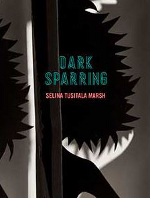
Dark Sparring by Selina Tusitala Marsh
Auckland University Press, 2013
The first epigraph to Selina Tusitala Marsh’s new collection is from Muhammad Ali; ‘The fight,’ he says, ‘is won or lost far away from witnesses – behind the lines … long before I dance under these lights’. Behind Tusitala Marsh’s lines of poetry, there is an immense reserve of strength and grace, enough to sustain the poet through her mother’s death from cancer and to channel her fear and anger into rhythms of the Muay Thai kickboxing ring and the page.
A prologue, titled ‘Matariki’, acts as an invocation. Matariki is the Maori New Year, and the name of one of Tusitala Marsh’s students, who had recently lost her mother. The narrator urges Matariki to:
write what you remember write your lost and found write the toiling of the year’s grief write the seeding of the new (1).
This repeated imperative declares the purpose of the collection. While Part I is, ostensibly, more concerned with politics of place and belonging than personal grief, the invocation in ‘Matariki’ adds an elegiac mood:
sea skin sheening low clouds keening Fuller’s disembowelling white scarves towelling (4).
‘Chant from Matitia to Orapiu’ presents Waiheke Island in present continuous verbs, rhyming sinuously down the page. The oscillating lineation provides the movement promised on the back cover. During the months of grief, the blurb explains, the fatele, a traditional Tuvaluan dance, and Muay Thai ‘began to echo each other and to take shape in words … in the sparring my body learned to swing, pivot, move with a raw instinct in defence and in attack. My mind began following my body’.
The poet’s sensitivity to physical settings leads gradually into sharp, often witty, analyses of what it means to belong. In ‘Niu Sila Skin’, the narrator’s uncle
can’t handle the heat they say his blood’s too cold from the ice, the hail the oversized Fisher and Paykel fridge-freezer standing in the corner of his own straight kitchen’ (12)
Tusitala Marsh’s language is controlled. The man ‘in the blue mother hubbard/ languors in the doorway’ (13); he could have ‘lingered’, but ‘languors’ better captures the place’s sultry, unhurried atmosphere.
This linguistic control is used to satirical effect as the section progresses. Tusitala Marsh employs mimicry, found fragments and juxtaposed dictions to repeatedly pose questions of national identity. In ‘Afakasi Archipelago’, the question comes in a page of dense, smooth haiku:
Anthelmintic faiths avatar kaumatua abridge skulduggerous ichthyology (18).
Towards the end of Part I, two poems weaken the complexity and clarity of Tusitala Marsh’s questioning. ‘LEAD’, dedicated to “BEST Leadership Academy” and ‘New Zealand, the Lucky Country’, to “Leadership New Zealand and Jo B”, appear politer and flatter than the preceding poems. Often, Tusitala Marsh brightens the platitudes with more surprising lines (‘Lead with national excellence and innovation/ Lead through intimate conversation’ [27]), but the overall certainty of the poem’s message, paradoxically, feels dubious. This certainty is apparent in ‘New Zealand, the Lucky Country’, to the extent that the reader might view the refrain as ironic. The lack of punctuation in
Yes, New Zealand’s a lucky country if you’re not Tangata Whenua you’re Tangata Tiriti
makes the sentiment ambiguous, which sits oddly with the poem’s sure ending. ‘New Zealand’s a lucky country if you’re not Tangata Whenua (indigenous)’? Or, ‘New Zealand’s a lucky country. If you’re not Tangata Whenua, you’re Tangata Tiriti (immigrant)’? Rich imagery, agile rhythm and wit are evident in these commissioned poems, but they don’t dance as the rest of the collection does.
The fight returns immediately in Part II. Cancer appears in various guises throughout the section. Malignant cells are personified as the god-like body’s creations in ‘Genesis’. Grief is viewed as a plane crash in ‘A photo album, an op-shop bargain and a grandbaby’ with the shocking first line ‘these items are flotation devices’ (47). The disease becomes a kidnapper sending ransom notes, and the treatment is a choose-your-own-adventure novel.
As the section proceeds, the metaphors are shed; instead of turning the illness into easier forms, Tusitala Marsh addresses it head-on in ‘13 Ways of Looking at Mourning’. Along with ‘Blackbird’ and ‘50 Ways to Read a Mother’, this poem acknowledges Wallace Stevens’s influence.
The metaphors of the fatele and the fight provide the strongest language and offer the clearest perspectives from which Tusitala Marsh examines her grief. In ‘Fatele’, she writes, ‘E tasi te ‘gana e se tāitāi o lava./ One language is never enough’ (79). Like the jab, hook, elbow and backfist described in ‘Muay Thai on Saturdays’, Dark Sparring deftly employs an artillery of languages to attack the opponent that is the narrator’s grief.
Tusitala Marsh’s first collection, Fast Talking PI, was named Best First Book at the 2010 New Zealand Book Awards. Dark Sparring must be a strong contender for this year’s Awards.









